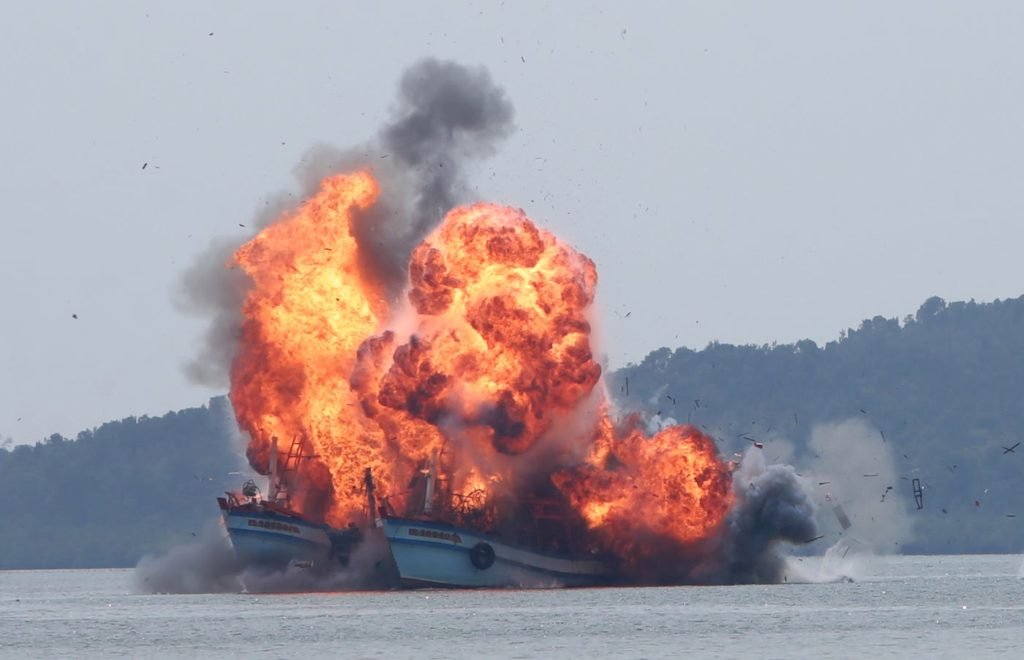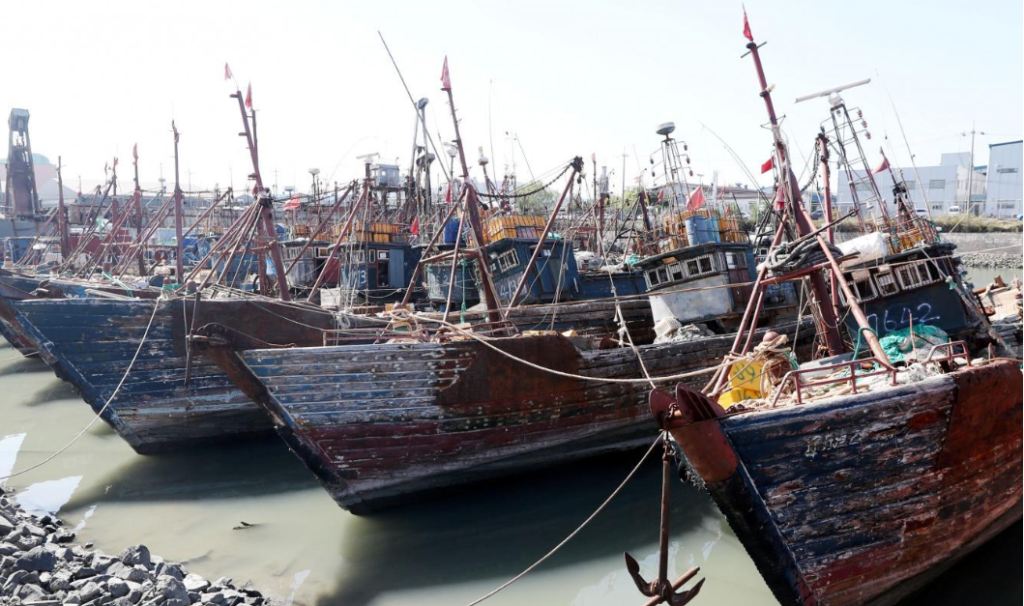China is stealing fish stock of the world that can be a flash point of future Conflicts. With nearly 3,000 vessels, China’s overseas fishing fleet is the world’s largest fleet that is rapidly expanding as the country emphasizes policies aimed at shoring up food supplies. As the Chinese overseas fishing fleet ranges all over the globe, it is getting criticized for over-fishing and coming into confrontation with other countries’ vessels in contested areas such as the South China Sea and as distant as West African Coast Countries and South American seas.
China is the world’s largest producer and exporter of fish with around half its seafood production being exported to developed countries; it is also the largest consumer of seafood.
Lust to grab all the resources worldwide, China with the world’s largest fleet of deep-sea fishing vessels, is having an outsize impact on the globe’s oceans. In 2017, 34.2 percent of the fish stocks from the world’s marine fisheries were classified as overfished and “biologically unsustainable”, a “continuous increasing trend” since 1974, when that figure stood at just 10 percent.
Having depleted the seas close to home, Chinese fishermen are sailing farther to exploit the waters of other countries, their journeys often subsidized by a government more concerned with stealing the fish stocks from other nations and driving poor countries in African coasts further poor by stealing their fishing stocks.
Duncan Ledbetter, a director of the fisheries and natural resource consulting company, Fish Matter, said:-
“A race for diminishing resources is driving China’s search for fish around the world, with fish habitats near China’s coast having succumbed to pollution and overfishing.”
Local fishermen in African coastal areas that used to have boat load of catch of fishes, are returning with empty nets because of over fishing by the Chinese in African waters.
Increasingly, China’s growing armada of distant-water fishing vessels is heading to the waters of West Africa, drawn by corruption and weak enforcement by local governments. West Africa, experts say, now provides the vast majority of the fish caught by China’s distant-water fleet. And by some estimates, as many as two-thirds of those boats engage in fishing that contravenes international or national laws.
It is estimated that over a billion people worldwide are engaged in fishing and ancillary industries. However, with China stealing all the fish stocks of the world, livelihood of majority of these people, living in different countries is at stake. Moreover, Chinese stealing the fish stocks of other countries from International Waters is impacting the food security of those countries and also directly impacting the income of those nations.
Countries on the Atlantic and Pacific coasts have also been affected, and most of the illicit fishing activity in those areas is done by Chinese vessels.
Juan Carlos Sueiro, fisheries director for Peru at the ocean conservation and advocacy organization Oceana, said that Peru and Argentina saw “the largest congregation of these vessels in the world.”
“Refrigerated fishing vessels can be found in international waters to transfer their captures, fuel, and supplies,” he said, adding that transshipment activity, which can launder profits from illegal fishing, had also been detected.
Rising Demand and Over-fishing by Chinese in other Countries waters can spark new conflicts
Officials and experts have warned that rising demand for fish and increased competition over dwindling stocks could spark new conflicts. Many of them have pointed specifically to China.
Fishing stocks around China have shrunk dramatically. But Beijing has expanded its distant-ocean fishing fleet, and those vessels have been involved in disputes as far afield as Argentina, where the coast guard has sunk and fired at them and in Africa, where Chinese firms are building fish-processing facilities.
A Chinese fishing boat after the South Korean coast guard fired a flash-bang grenade at it to stop it off Hong Island, South Korea, September 29, 2016. Three Chinese fishermen were killed.
In a September 2017 article, retired US Navy Adm. James Stavridis and a coauthor noted that Beijing was spending hundreds of millions of dollars annually to subsidize its long-range fishing fleet and that its coast guard often escort those ships while they fish illegally.
“As such, the Chinese government is directly enabling and militarizing the worldwide robbing of ocean resources,” they said.
In September 2018, US Coast Guard Cmdr. Kate Higgins-Bloom wrote that “the odds that a squabble over-fishing rights could turn into a major armed conflict are rising.”
Anger Against Chinese Fishing Vessels Worldwide
Indonesia has blown up boats caught fishing illegally, including a Chinese vessel, and the country’s fisheries minister has said what Chinese fishing boats “are doing is not fishing. It is transnational organized crime.”

In 2016, a Deep Water Fishing (DWF) vessel in China named “Lu Yuanyang Yu 010” was suspected of conducting IUU fishing in Argentine waters and refused to cooperate with Argentine police by attempting to flee to the high seas despite of the warning shots from the coast guard. It has finally been fired and sank into water. In February 2018, another fishing vessel “Jing Yuan Yu 626” from the same fishery company operated in the adjacent water of Argentine EEZ, and has been again warned and dispelled by Argentine Coast Guard.
March 16, 2016 Argentina sinks Chinese vessel, cites illegal fishing
March 4, 2019 Argentine coast guard opens fire on Chinese fishing vessel
But as they press toward other countries, Chinese fishermen have become entangled in a growing number of maritime disputes.
Indonesia has impounded scores of Chinese boats caught poaching in its waters, and the Argentine authorities sank a Chinese vessel that tried to ram a coast guard boat. Violent clashes between Chinese fishermen and the South Korean authorities have left a half-dozen people dead. https://www.reuters.com/article/us-southkorea-china-fishermen-idUSKCN12B09O

The fiasco is the latest in a string of similar incidents in Argentina and elsewhere in South America. In February 2018, the Hua Li 8, owned by the Zhoushan Hua Li Distant Water Fishery Co., was apprehended in Indonesia and forced to pay an ARS 7 million (USD 175,800, EUR 155,200) fine for fishing illegally in Argentine waters. A separate vessel, the Jing Yuan 626, is still being sought by Argentina for illegal fishing in its waters for suspected illegal fishing. It is owned by the Yantai Bei Jing Distant Water Fishing Co., located in Yantai city near Qingdao on China’s east coast. In 2016, the Lu Yan Yuan Yu 010, owned by the Yantai Distant Water Fishing Co., which had a long history of fishery incidents abroad, was sunk by the Argentine navy after being caught fishing illegally. And in February 2019, another Chinese vessel, the Zhongyuanyu 11, collided with a Spanish vessel, the Pesca Vaquiero, 16 kilometers outside the Argentine EEZ.
Ecuador, meanwhile, continues to hold crew members from the Fu Yuan Yu Ling 999, a reefer detained for illegal fishing of protected species in March 2018.
“There’s no need to worry [about conflicts with other nations] as we have government vessels protecting us,” a Chinese fisherman said in September 2017, after the expiration of a fishing ban in the South China Sea.
“China clearly intends to exploit regional seas, and many species already suffer the consequences,” the article adds. “Confronting the Chinese voracity for marines resources requires a regional commitment that can’t wait.”
China’s distant-water fishing fleet has grown to more than 3,000 vessels (the United States has fewer than one-tenth as many), with 400 boats coming into service between 2014 and 2016 alone. Most of the Chinese ships are so large that they scoop up as many fish in one week as Senegalese boats catch in a year, costing West African economies $2 billion a year, according to a new study published by the journal Frontiers in Marine Science.
Stealing the livelihood of poor countries like Sengal for Lust to capture market share
Many of the Chinese boat owners rely on government money to build vessels and fuel their journeys to Senegal, a monthlong trip from crowded ports in China. Overall, government subsidies to the fishing industry reached nearly $22 billion between 2011 and 2015, nearly triple the amount spent during the previous four years, according to Zhang Hongzhou, a research fellow at Nanyang Technological University in Singapore.
That figure, he said, does not include the tens of millions in subsidies and tax breaks that coastal Chinese cities and provinces provide to support local fishing companies.
According to one study by Greenpeace, subsidies for some Chinese fishing companies amount to a significant portion of their income. For one large state-owned company, CNFC Overseas Fisheries, the $12 million diesel subsidy it received in a year made the difference between profit and loss, according to a corporate filing.
“Chinese fleets are all over the world now, and without these subsidies, the industry just wouldn’t be sustainable,” said Li Shuo, a global policy adviser at Greenpeace East Asia. “For Senegal and other countries of West Africa, the impact has been devastating.”
In Senegal, an impoverished nation of 14 million, fishing stocks are plummeting. Local fishermen working out of hand-hewn canoes compete with mega trawlers whose mile-long nets sweep up virtually every living thing. Most of the fish they catch is sent abroad, with a lot ending up as fishmeal fodder for chickens and pigs in the United States and Europe.
The sea’s diminishing returns mean plummeting incomes for fishermen and higher food prices for Senegalese citizens, most of whom depend on fish as their primary source of protein.
“We are facing an unprecedented crisis,” said Alassane Samba, a former director of Senegal’s oceanic research institute. “If things keep going the way they are, people will have to eat jellyfish to survive.”
If the fishing was only for domestic consumption it was a different subject, but Chinese want to capture seafood market in the entire world by removing the competition. This hunger to capture the whole world is the beast that doesn’t care for either the health of Oceans nor the situation of countries around Atlantic or Pacific Oceans.
Countries like India are still not familiar with concepts of Deep Sea Fishing
China is earning millions of dollars by fishing in the southern Indian Ocean using deep-sea trawlers that can operate for several months at a stretch. The Chinese vessels enjoy a monopoly in deep-sea fishing in the Indian Ocean given that the India government does not promote fishing in the high-seas. The Central and state government rules also prohibit the use of advanced fishing gear and technology, thereby rendering fishing in the high-seas an unfeasible option for Indian fisherfolk.
As per people, “India will wake up only once Indian Fishermen return with empty nets realizing that the fish stock in Indian Ocean has been scooped by China leaving no fishes for India.” People in India advocate for strong measures to handle China including sinking fishing boats in Indian Ocean as China has no business in Indian Ocean. Or Indian Government should allow Indian Fishing companies to go to South China Sea for deep see fishing.
Subsidies.
In 2006, China started to provide fuel subsidies as a way to gain a competitive edge in the Deep-Water Fishing (DWF) industry. Fishing vessels can apply for subsidies at the beginning of each year based on their compliance performance in the previous year. However, to certain extent this policy leads to unregulated capacity expansion and over-fishing.
However, when International community confronted China on subsidies, China started doing theatrics and those ships that did not give bribes to officials, government began to selectively cut subsidies in the name of structural reforms in fisheries. Fuel subsidies was replaced by financial supports to the modernization and renewal of fishing vessels, via vessel scrapping programs and vessel standardization programs (Ministry of Finance, 2016).
Over the last twenty years, China’s distant-water fleet has grown considerably, partly due to the over-fishing and depletion of fish stocks within its own exclusive economic zone (EEZ). This prompted Chinese fishing fleets to expand their reach outside the EEZ, ensuring fish for domestic consumption and trade exports. In addition, China has provided its distant-water fleet with fuel subsidies, to such an extent that recent research has shown its operations may not be profitable without them.
China’s fishing industry employs more than 14 million people, up from five million in 1979, with 30 million others relying on fish for their livelihood.
“The truth is, traditional fishing grounds in Chinese waters exist in name only,” said Mr. Zhang of Nanyang University. “For China’s leaders, ensuring a steady supply of aquatic products is not just about good economics but social stability and political legitimacy.”
For Beijing, the nation’s fleet of fishing vessels has helped assert its territorial ambitions in the South China Sea. In Hainan Province, the government encourages boat owners to fish in and around the Spratlys, the archipelago claimed by the Philippines, and the Paracel Islands, which Vietnam considers its own.
China has witnessed sound development in both volume and production in this industry in the past three decades. According to FAO statistics, the total amount of marine catch in 2016 was 79.3 million tons worldwide, of which about one-fifth came from China (FAO, 2018a; 2018b). The production of China’s distant water fisheries reached 1.98 million tons in 2016, accounting for 13% of total marine production, an increase of 78% compared with that in 2010 (Ministry of Agriculture Fisheries Administration, 2017). The main target species are tuna, squid, mackerel, saury and Antarctic krill. By the end of 2016, there were 162 distant water fishing (DWF) enterprises nationwide (an increase of 46% compared with 2010), and 2874 DWF vessels (of which 2571 were active), mainly by longline, purse seine and trawling, 3 on waters of 42 States and regions, in the Pacific Ocean, the Indian Ocean, the Atlantic Ocean and the Antarctic waters.
Greenpeace points out in a 2015 report that the irresponsible fishing activities of Chinese fishery companies, inter alia, vessel gross tonnage fraud, destructive fishing gears, unlicensed fishing activities, fishing in prohibited areas, have seriously undermined the long-term sustainability of fisheries in West African (Greenpeace, 2015). Due to the opacity of bilateral agreements with coastal countries and loose regulation of fisheries authorities, distant water fishing companies tend to bypass regional and international fisheries regulations and conduct IUU fishing. It is a common practice for its vessels to conduct overfishing in the high seas and foreign exclusive economic zones (Greenpeace, 2015). This report, to certain extend, expresses the concerns of the international community for China’s distant water fisheries. Meanwhile, some scholars have pointed out that the management of China’s DWF is not as strict than in its domestic fisheries (Chen et al., 2006). Some fishing vessels have multiple IUU fishing records, yet have not been penalized accordingly (Zhang & Wu, 2017) (Shen & Heino, 2014).
How do Chinese do Illegal, unreported and unregulated fishing (IUU) fishing?
Chinese do the fishing that breaks fisheries laws and regulations or occurs outside their reach.
Illegal fishing usually means without a license, in an area where fishing is banned, with prohibited gear, over a quota, or for protected species. Very often China’s vessels enter other nation’s water with no fishing license, or fishing with a license but catching more than is allowed.
Then there is the problem of unreported and under-reported catches by licensed vessels looking to flout quotas or catch prohibited species.
Though most of the world’s fish are caught in the national waters of coastal states – within 200 nautical miles of their shorelines, but since China has depleted its fishing stocks due to pollution and over fishing – a lot of Chinese unregulated fishing occurs beyond that on the high seas which cover almost 45% of our planet. Patchy regulation and enforcement in this vast area allow rampant IUU.
Where does it happen?
Chinese Illegal, unreported and unregulated fishing (IUU) occurs everywhere, from the most remote stretches of the ocean of African Continent to South American Seas. It particularly affects nations in the global south where fisheries management is poorly developed, or where there are limited resources to oversee their waters or enforce regulations. West Africa and the Western Central Pacific are assessed as having the highest rates of illegal fishing, followed by the Bering Sea and the Southwest Atlantic.
Why is Chinese Illegal, unreported and unregulated fishing (IUU) such a serious threat?
Chinese Illegal, unreported and unregulated fishing (IUU) contributes to the over-exploitation of fish populations, hinders their recovery and damages the marine environment. Thousands of marine species die as bycatch and delicate habitats are destroyed by the unregulated use of harmful practices like bottom-trawling.
IUU adversely affects the wellbeing of fishing communities, especially in the global south where many people rely on fish for food and revenue. It exacerbates poverty and contributes heavily to food insecurity. It also has direct ties to organized crime including human trafficking, drug smuggling, and slavery.
What enables Chinese Illegal, unreported and unregulated fishing (IUU)?
One major obstacle in the fight against IUU is flags of convenience – flown by Chinese fishing vessels to take advantage of minimal regulation, cheap registration fees, low or no taxes and the ability to employ cheap labor. While the practice is not illegal, using a flag of convenience allows Chinese fishers to conceal their operations or avoid international laws designed to conserve marine resources. Thirty-five nations have open registries where an owner doesn’t need to meet any nationality or residency requirements. The most famous is Panama – a tiny nation with the world’s largest shipping fleet (by some estimates). But land-locked countries such as Bolivia and Mongolia are also involved. Open registries conceal the true owners of a vessel; facilitate tax avoidance and appalling working conditions for seafarers; and are linked to devastating oil spills.

Another favorite Chinese IUU practice is transshipment – where vessels fishing in the high seas for high-value species like tuna offload their catch onto refrigerated transport vessels known as “reefers”. The reefers bring food, fuel, bait and labor and take away the catch as boxes of frozen fish. It is technically legal, and a cost-effective way for vessels to remain at sea for longer. But because the vessels do not come into port, it is hard to determine whether the catch is legal. Chinese vessels transshipping were illegally caught fish off the coast of West Africa.

Chinese ships often move without the International Maritime Organization (IMO) ship numbering scheme—or IMO number.

The Port State Measures Agreement (PSMA) came into effect in June 2016. It is the first binding international agreement to stop illegally caught fish entering markets through ports. To date, 66 nations plus the European Union are party to the PSMA. China despite repeated requests has not yet signed the Agreement.
Over-fishing depletes stocks at a rate that the species cannot replenish and so leads to lower fish populations and reduced future production.
As per one Chinese fisherman in the port city of Zhoushan on China’s east coast,
“500 trawlers raced out to sea on the first day of the season. Every season is harder than the last. The fleet have to head deeper into the ocean and stay for longer for a decent catch.”
The mounting number of incidents is putting intense scrutiny on China to take action, though the country is somewhat protected by the fact that it owns a significant portion of the debt of many Latin American countries, and has additional leverage in Argentina as a major purchasers of the country’s agricultural exports.
In general, IUU fishing activities of Chinese vessels are not only detrimental to the sustainable development of the distant water fisheries, but also stain the image of its flag State as a responsible fishing participator.
Points to Ponder
Shouldn’t US, EU, African Continets, Asian Countries decide to blow up any Chinese Deep See Fishing Vessels that are misusing the International laws governing International Waters and Fishing?
What Right has China to go fishing in the sea near Argentina or West Africa or Indian Ocean? Is it not the flaw in International Laws that permit rogue countries like China to bring poverty and misery to other Billion people whose lives depend on fishing and anciliary industries? Shouldn’t such International Laws be struk down and either new laws be made or such conflicts can spiral into future wars.
Imagine a Chinese Fishing Vessel fishing near the Canadian Coast or the near the US Coast. Could such vessels not be used for smuggling illegal drugs and arms in other countries? If Countries start sinking Chinese Fishing Vessels worldwide, will it not start a war?
When every country is boycotting Chinese products, why is China still going fishing? Is China anticipating a war in near future and want to fill up its food stocks in a hurry?
Related Article: Government Of India Bans 59 Chinese Mobile Apps including Tik Tok
Previous Article: Bills To Strengthen India-US Defence Ties Introduced by US Senators
Follow us at:-
Twitter Handle: @newscomworld
Instagram Handle: @newscomworld
Parler Handle: @newscommuniquecom
Subscribe our : YouTube Channel https://www.youtube.com/channel/UCnKJQ3gFsRVWpvdjnntQoAA
Like our Facebook Page https://m.facebook.com/News-Communiquecom-103788531007438/
2,174 total views









